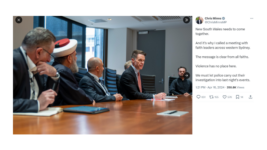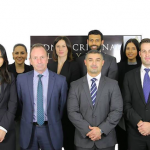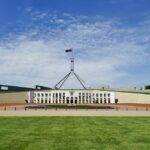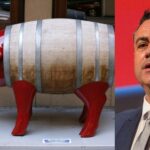Proselytising from the NSW Lower House, and the Rise of Faith in State Politics

“Well look, I’d just say that obviously in a city as big as Sydney, in a state as big as NSW, when you’ve got a multicultural, multifaith community, it’s hard to get 100 percent of those communities and those members of those communities doing the right thing,” the NSW premier told 7.30 on 16 April.
Premier Chris Minns was referring to the recent stabbing of a priest at a Wakeley church in western Sydney by a boy of just 16, who happens to be a Muslim, along with the subsequent riot that ensued.
And Minns was on the TV the next evening, mopping up after NSW police commissioner Karen Webb dropped it on reporters at 1.30 am that she considered a 90-minute-long journey across town by a Muslim teen, coupled with religious overtones to an attempted murder, equals terrorism.
But this designation raises questions, such as would a Buddhist stabbing a Hindu equate to terrorism if he was motivated by, say, an issue regarding caste, and would it have occurred to Webb and her law enforcement buddies to wait until morning to run that by the premier before making the call.
Although, that may not have helped, as while NSW police contemplated a terror designation, the premier was off convening a late-night meeting of western Sydney faith leaders to discuss the attempted murder, which, as Greens MP Jeong Leong pointed out on X, was an old boys’ faith club.
Who art in parliament
“NSW needs to come together,” Minns wrote on X, above photos of himself sitting with Sydney faith leaders to discuss a 16-year-old boy stabbing a 53-year-old man in front of a crowd of people in the immediate aftermath of the crime, which doesn’t appear to be regular government protocol.
Many might have been sidelined by a NSW Labor premier progressing this religious agenda, rather than a Coalition leader, especially as Dominic Perrottet was the last top minister, but the truth is, both major parties had their sights on dragging the pulpit into the lower house last election.
As NSW constituents moved slowly toward the ballot box of March 2023, the major party candidates for premier, who it was well known took their respective faiths fairly seriously, were both spruiking the establishment of a faith advisory council or a religious voice to parliament.
Sure, this prioritisation of faith in the secular realm might not be the obvious choice for late 2022, but it made a lot more sense within the context of former PM Scott Morrison having just run his failed yearslong religious freedoms crusade, which federal Labor is now contemplating a repeat of.
And this has all been compounded by the fact that federal Labor sure-thing Kristina Kenneally, a devout Catholic, lost the western Sydney Labor safe seat of Fowler in May 2022 to Independent candidate Dai Le, who’s also Catholic.
The majors, however, don’t seem to register that the double standards of the 2021 lockdown imposed upon southwest and western Sydney impacted hard on those communities, with the heightened law enforcement and then military presence leaving a lasting impression.
Minns further advised the ABC that his late-night meeting with faith leaders had resulted in them, “unanimously”, calling for calm and condemning “any violence in Sydney”.
And while this could have potentially been ascertained via a group email the following day, that wouldn’t have conveyed the understanding that faith is now being inserted into the political sphere, which, from a secular viewpoint, might not be the best option for the state to take at this point.
In his faith leader post, Minns added that the need for social cohesion had led him to call “a meeting with faith leaders across western Sydney” on that Monday evening, with the clear message “from all faiths” being that “violence has no place here” and “we must let police” investigate the matter.
Religious fervour
The Rationalist Society of Australia, along with other nonfaith groups, such as Sydney Atheists, have been calling out the establishment of the NSW Faith Council, as it provides no representation to those without a religion, which accounts for 33 percent of the constituency since the last Census.
Launched late last year, the NSW Faith Council is now comprised of 19 representatives from differing faiths, and it has a direct hotline to multicultural minister Steve Kamper.
And the point could be made that both major parties sought such a council to add faith perspectives to enhance the outlook of the secular polity.
Yet, the idea that the potential premiers were considering NSW as a secular entity, begins to blur, if one considers that Minns told the ABC in the immediate aftermath of the stabbing and resulting riot that such violence was inconsistent with “the vast, vast majority of people of faith in NSW”.
The premier then suggested that most people of faith in NSW “find that kind of violence deplorable and would never ever participate in it” because, he continued, the fact is most would find it “completely antithetical to their religious beliefs”.
At this point, however, it’s clear, the premier was only focused on two-thirds of the constituency, who he considers are obviously able to make such clear moral judgments due to the guidance of their faiths.
Although the premier should be made aware of the fact that a Human Rights Act for NSW would provide moral guidance in regard to social behaviour to all in the constituency regardless of faith, as this is a way a secular state can guide its flock when it comes to the inner realm.
Reclaiming the polity
This infiltration of religion into politics didn’t commence with the Minns-Perrottet tag team though, as the Rationalist Society of Australia’s recent submission to the Senate inquiry into rightwing extremism, warns that Christian dominionists have for years been attempting to infiltrate politics.
The 2021 Church and State summit saw then Liberal National MP George Christensen openly discussing infiltrating the Coalition to sway policy in a Christian direction, while the SA Liberals had to purge 150 newly joined Pentecostals that year, and it questioned the legitimacy of 400 more.
“We are concerned about the more extreme forms of dominionism and their potential threat to the separation of church and state, and to Australia’s pluralistic democracy,” the RSA submission reads, and it further outlines that dominionist doctrine advises infiltration of various social spheres.
Another key Christian Right political figure is Scott Morrison. And the last standing prime minister declared, during his 2008 maiden speech in parliament, that “Australia is not a secular country. It is a free country.”
Morrison then led a campaign to insert divisive religious privileging laws into federal law, wrapped up in needed religious discrimination protections. And now Albanese is going to have his turn at a religious freedoms debate, all because Fowler was lost to double standards and racism.
On earth as it is in heaven
As previously mentioned, Minns told 7.30 host Sarah Ferguson that “the vast, vast majority of people of faith in NSW, not only would find that kind of violence deplorable but would never, ever participate in it,” in relation to the stabbing and subsequent rioting on 15 April.
The premier then added, the vast majority of NSW people of faith wouldn’t participate in such violence as it is “completely antithetical to their religious beliefs. In fact, it’s the opposite of what they’re taught on Sundays from the pulpit.”
So, not only did the premier exclude those of nonfaith, 33 percent of NSW, whilst preaching from the TV screen, but he then went on to identify that most of those he was addressing are taught on Sundays from the pulpit, meaning most good upstanding citizens he considers are Christians.
And it should be noted that whilst both major parties are flashing their multifaith credentials around parliament, the truth of the matter is parliament still recites a Christian prayer before each session, and the majority of members who are of faith hold to Christian doctrines.
Which likely means that the increasing emphasis on instilling the religious into the political sphere will, first and foremost, advance the preexisting dominant influence of the Christian faith over politics and the little time allocated to the leaders of other faith groups will simply be lip service.







